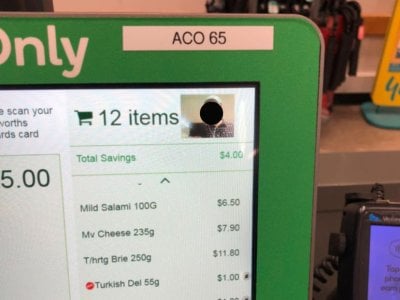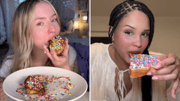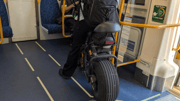Woolworths and Coles shoppers in shock over quality of self-serve cameras: ‘Meant to make you look ugly’
By
Seia Ibanez
- Replies 74
In the age of social media, we've all become more conscious of how we look on camera.
But have you ever noticed that the self-serve checkout cameras at supermarkets like Woolworths and Coles seem to capture you at your worst?
Well, you're not alone, and there might be a method to this madness.
An online discussion has sparked a wave of shock claims that the unflattering angles and poor quality of self-serve checkout cameras at major Australian supermarkets are intentional.
The debate, which began on social media and quickly gained traction, suggested that these cameras use 'super wide' lenses that distort your appearance, making you look, well, less than your best.

The original post, which has since stirred hundreds of reactions, saw shoppers sharing their experiences of self-checkout camera shock.
‘Are the self-serve cameras meant to be unflattering, or is it just me?’ they asked.
'Whenever I see myself in the self-serve cameras at Coles and Woolies, I’m always mortified by the person staring back at me.’
This sentiment was echoed by many, with comments ranging from humorous to downright conspiratorial.
But why would supermarkets want to make us look bad? Some shoppers believe it's a 'psychological technique' to deter theft.
The theory goes that making you look like you're in a 'mug shot' would make you less inclined to engage in sticky-fingered activities, knowing that an unflattering image of you could be used as evidence.
Others pointed out that the wide-angle lenses, combined with the less-than-stellar lighting and screen quality, are simply not flattering for anyone. '
They’re a super wide angle lens—they're gonna make Miranda Kerr look like a gronk,' one user quipped.
‘Wide lens, plus you are used to seeing yourself mirrored,’ another said.
‘They’re meant to make you look ugly. They’re saying, “If you steal, we’re gonna use this photo of you,”’ a third added.
‘I feel that if the prices don’t get you down, then your face looking back at you will. They are just covering all bases at this point,’ one person shared.
‘Puts me off from stealing; don’t want that ugly mug posted on crime stoppers for all to see,’ another shared.
In response to these concerns, some customers have taken acts to keep their privacy intact.
A Coles customer shared an image of himself covering the at a self-serve checkout in January in an act of defiance against being recorded.
Meanwhile, another Coles shopper was ridiculed for covering the camera with a receipt to ‘take back’ his privacy.
Despite privacy concerns, Coles and Woolworths maintained that their AI technology at checkouts does not collect sensitive biometric data or store personal information.
 Have you ever been taken aback by your appearance on these cameras? Do you think there's truth to the theory that it's all a tactic to prevent theft? Share your experiences and opinions in the comments below!
Have you ever been taken aback by your appearance on these cameras? Do you think there's truth to the theory that it's all a tactic to prevent theft? Share your experiences and opinions in the comments below!
But have you ever noticed that the self-serve checkout cameras at supermarkets like Woolworths and Coles seem to capture you at your worst?
Well, you're not alone, and there might be a method to this madness.
An online discussion has sparked a wave of shock claims that the unflattering angles and poor quality of self-serve checkout cameras at major Australian supermarkets are intentional.
The debate, which began on social media and quickly gained traction, suggested that these cameras use 'super wide' lenses that distort your appearance, making you look, well, less than your best.

Shoppers claimed that self-serve cameras at Woolworths and Coles make you look ‘unflattering’. Credit: Twitter
The original post, which has since stirred hundreds of reactions, saw shoppers sharing their experiences of self-checkout camera shock.
‘Are the self-serve cameras meant to be unflattering, or is it just me?’ they asked.
'Whenever I see myself in the self-serve cameras at Coles and Woolies, I’m always mortified by the person staring back at me.’
This sentiment was echoed by many, with comments ranging from humorous to downright conspiratorial.
But why would supermarkets want to make us look bad? Some shoppers believe it's a 'psychological technique' to deter theft.
The theory goes that making you look like you're in a 'mug shot' would make you less inclined to engage in sticky-fingered activities, knowing that an unflattering image of you could be used as evidence.
Others pointed out that the wide-angle lenses, combined with the less-than-stellar lighting and screen quality, are simply not flattering for anyone. '
They’re a super wide angle lens—they're gonna make Miranda Kerr look like a gronk,' one user quipped.
‘Wide lens, plus you are used to seeing yourself mirrored,’ another said.
‘They’re meant to make you look ugly. They’re saying, “If you steal, we’re gonna use this photo of you,”’ a third added.
‘I feel that if the prices don’t get you down, then your face looking back at you will. They are just covering all bases at this point,’ one person shared.
‘Puts me off from stealing; don’t want that ugly mug posted on crime stoppers for all to see,’ another shared.
In response to these concerns, some customers have taken acts to keep their privacy intact.
A Coles customer shared an image of himself covering the at a self-serve checkout in January in an act of defiance against being recorded.
Meanwhile, another Coles shopper was ridiculed for covering the camera with a receipt to ‘take back’ his privacy.
Despite privacy concerns, Coles and Woolworths maintained that their AI technology at checkouts does not collect sensitive biometric data or store personal information.
Key Takeaways
- A shopper on social media sparked a debate about the appearance of customers in the self-serve checkout cameras at supermarkets such as Coles and Woolworths.
- It has been claimed that the wide-angle lenses used in the cameras can make customers look very unflattering, which some believe may be a deliberate psychological tactic.
- The social media post received numerous reactions, with many users agreeing that the camera footage made them feel self-conscious and looked worse than in reality.
- Some comments suggested that the unflattering images could be intended to discourage theft by making potential thieves worry about unattractive images of them being used as evidence.







